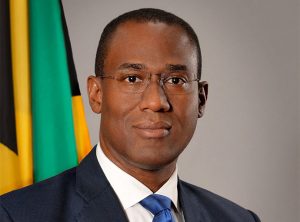

Minister of Finance and the Public Service
The Restructuring of Public Sector Compensation

Economic reform is never easy. This is especially the case when the policy matters under consideration are highly technical in nature and the public space for informed and in-depth commentary is underdeveloped.
Monetary policy – the process by which the monetary authority (which, in our case, is the Bank of Jamaica) varies money supply and sets policy interest rates – is one of those areas of our economy that is least understood by the public.
This is partly the result of our torturous monetary history, which has been characterised by decades of sustained high inflation, high interest rates, and persistent devaluation. We have little experience with a ‘normal’ monetary environment. This makes monetary policy reform even more challenging.
The Government of Jamaica has been gradually implementing reforms to transition monetary policy towards the explicit and sole objective of targeting specific levels of inflation, ushering in a new era of consistently low, stable, and predictable inflation. The most significant of these reforms, BOJ modernisation, is to be tabled in October. This entails (i) changing the central bank mandate to make the preservation of purchasing power its primary goal, (ii) improving BOJ’s governance, (iii) strengthening the BOJ’s balance sheet, (iv) enhancing the BOJ’s accountability and (v) institutionalising the BOJ’s independence.
In the meantime, however, 12-month inflation to April, May, June, and July was 3.2%, 3.1%, 2.8% and 3.2%, respectively, and against the background of being told for years that ‘low inflation’ is good for Jamaica, why target a higher inflation rate of 5% (plus or minus 1%)?
The fact that the monetary policy question in 2018 is whether the inflation target should be 3% or 5% reflects a significant collective achievement that should not go unrecognised.
In response to the question, we should first note that the definition of ‘low inflation’ has to be understood by reference to Jamaica’s historical experience. In Jamaica, inflation of 5% or below is a very recent phenomenon. We have had inflation consistently at 5% or lower for only the previous three of the last 30 years. In that context, therefore, an inflation rate of 5% for Jamaica has to be considered to be, and is, low.
Second, there is a relationship between the policy interest rate set by the Bank of Jamaica and future inflation outcomes that technocrats at central banks commonly call the ‘monetary transmission mechanism’. This relationship, or mechanism, reflects local circumstances and can be complex. It describes how changes in the policy interest rate are transmitted through the economy and how they affect short- and long-term market interest rates, asset prices, market expectations, demand for goods and services, and other variables, including inflation.
With current inflation outcomes at approximately 3%, a medium-term inflation target of lower than 5% (say, 3% or 4%) would not allow the BOJ as much flexibility to keep policy interest rates as low as they are now. This is so as in light of BOJ forecasts of (i) recovery of agriculture prices and (ii) oil prices remaining at current levels, inflation is projected to naturally trend upwards towards the current target of 5% in the medium term.
To counteract this, as the BOJ would be obligated to do with an inflation target lower than 5%, the central bank would need to consider raising interest rates to slow loan growth and curtail demand, which would serve the purpose of dampening inflation prospects. Obviously, in the current economic environment, this would conflict with the larger policy objective of promoting conditions that favour economic and employment growth in the context of debt reduction.
The converse is true. An inflation target of 5%, which, according to BOJ forecasts, will be naturally attained over the medium term, allows the BOJ some freedom and flexibility ‘today’ to not unduly worry about inflation exceeding the target ‘tomorrow’. This freedom and flexibility allow the central bank to maintain policy interest rates at current levels for longer than they otherwise could, all things being equal, thereby promoting loan growth, rising employment, and an expanding economy.
The evidence suggests that the policy is bearing fruit. According to BOJ data, loans from deposit-taking institutions to the private sector have increased by approximately 16% as at June 2018 over the comparable figure for June 2017. This compares favourably with private-sector loan growth of 12% as at June 2017 over June 2016. So we are witnessing an acceleration of loan growth, which augurs well for future economic growth.
Similarly, the PIOJ reports that residential mortgages are up by 25% in 2018 over 2017, a substantial increase. While it may be premature to celebrate the growth numbers, even there we are seeing positive upward momentum – from 1.0% in the September 2017 quarter, to 1.2% in the December 2017 quarter, to 1.4% for the March 2018 quarter and now a PIOJ forecast of 1.8% for the June 2018 quarter.
It should also be noted that for any given nominal interest-rate environment, lower inflation translates into a higher real interest rate, which impacts investment decisions.
The paragraphs above indicate that a lower inflation target (of, say, 3%) would precipitate higher nominal market interest rates, and by extension, higher real interest rates. When the real interest rate is positive and high (as it was for most of the 1990s and early 2000s for very different reasons), then capital can earn a real return outside of risk-taking productive activities. This is not what we want. We want an environment where capital, in the interest of generating a return, is incentivised towards risk-taking productive activities.
We achieve this by setting an inflation target, as we have done, that gives the BOJ adequate monetary policy space.
Published in the Gleaner – September 7, 2018
Dr Nigel Clarke is Minister of Finance and the Public Service and Member of Parliament for St Andrew Northwestern. Send feedback to opedjamaica@gmail.com.
The Hon. Nigel Clarke, D.Phil., MP
Minister of Finance and the Public Service
30 National Heroes Circle, Kingston 4
Tel: (876) 932-4656 / 4660 / 4655
Eml: opedjamaica@gmail.com







Finance Minister, Fayval Williams, notes comments in the public domain concerning the appointment of Mr. Dennis Chung as Chief Technical Director (CTD) of the Financial Investigations Division (FID) and a proposal that the Government inserts itself into the process by over-turning the recommendation of the Office of the Services Commission (OSC).

Finance Minister, Fayval Williams, notes comments in the public domain concerning the appointment of Mr. Dennis Chung as Chief Technical Director (CTD) of the Financial Investigations Division (FID) and a proposal that the Government inserts itself into the process by over-turning the recommendation of the Office of the Services Commission (OSC).

The Minister of Finance and the Public Service is pleased to announce the appointment of Mr. Dennis Chung as Chief Technical Director of the Financial Investigations Division (FID), effective June 2, 2025.

A Jamaica Teachers Association Memorandum dated April 23, 2025 to its membership from the Secretary General, Mark Nicely, stated that the Ministry of Finance and the Public Service had outlined that payments for the increments should be made during the first quarter of the 2025-2026 Financial Year.
Stay in the know with everything going on at the Ministry of Finance and the Public Service by subscribing the MOFPS INSIDER magazine.
Stay in the know with everything going on at the Ministry of Finance and the Public Service.